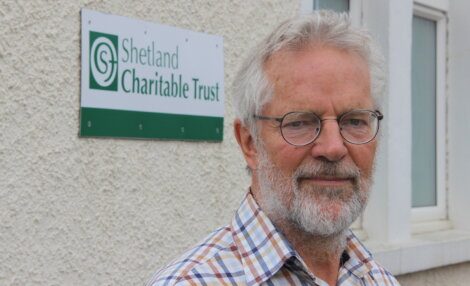Community / Charitable trust not a ‘rainy day fund’
SHETLAND Charitable Trust (SCT) will not be able to actively intervene in the growing cost of living crisis, according to its chair Dr Andrew Cooper.
The trust, which is currently valued at between £400 and £500 million, is also not a ‘rainy day fund’, and cannot be used to directly support those most impacted by spiralling energy costs and high inflation.
In a rare media interview, Dr Cooper said the trust was operating within a tight set of objectives which prevented it from initiating projects for the common good.
“We are a grant giver,” he told Shetland News. “We are depended on people applying to us for grants for work that they wish to do. And for us to give an organisation money their purpose has to be charitable.”
Dr Cooper was responding to the many calls made locally for the charitable trust to actively respond to the cost of living crisis that is forecast to push many families into poverty this winter.
Most of the newly elected councillors stood on a platform of using at least some of the council reserves to stem the crisis, and some even included the funds held in the charitable trust, which are separate from the council, in their proposals.
Earlier this week, Shetland central councillor Ian Scott, in a letter to Shetland News, expressed the view that the local authority, “along with the charitable trust” were well equipped “to least partially mitigate the impending crisis”.
But Dr Cooper pointed out that one of the trust’s main objectives was to maintain the “real value” of its funds in the long-term so that it will be able to continue supporting the many organisations it part funds on an annual basis.
More organisations in line to receive funding from charitable trust
Over recent years the trust has increased the amount of money it pays out annually to local charitable organisations to £16.4 million, including a multi-million pound fund for repair and maintenance of sport venues around the islands.
Become a member of Shetland News
He added that “the scale of the crisis is way out of the ability of any local organisations to make a significant impact”, and added that tackling the crisis needed “major government support” including a reform of the way the energy market operates.
He said the trust would “of course be willing to look” at any projects presented to it but pointed out that SCT itself “has no mechanism to initiate projects”.
“Any organisation that applies needs to have a sound footing. SCT staff would check if the organisation has the capacity to do what they are saying they would do to ensure trust funds are used in a responsible way,” he said.
Dr Cooper added that the trust was required to invest it funds in a prudent way, one that will guarantee a sufficient return to maintain its funds while at the same time be able to meet its commitments. It was not a vehicle for economic development, he said.
And the value of the trust – £435 million at the end of the 2021/22 financial year – was neither a “reserve” or a “rainy day fund”, he insisted.
“This is a common misconception,” he said. “It’s all money that is invested to generate the income that we use to support all the bodies that we do, and we will continue to support over the longer term.”
The trust effectively began life in the 1970s when Sullom Voe Terminal launched, receiving and disbursing money paid by the oil industry to the local community as compensation for the new facility operating in Shetland.
The charity provides yearly funding for Shetland’s main trusts covering arts, amenity and recreation – as well as the rural care model and host of other local groups and organisations. Its income source is now the gains it makes on its investments.
Become a member of Shetland News
Shetland News is asking its many readers to consider paying for membership to get additional features and services: -
- Remove non-local ads;
- Bookmark posts to read later;
- Exclusive curated weekly newsletter;
- Hide membership messages;
- Comments open for discussion.
If you appreciate what we do and feel strongly about impartial local journalism, then please become a member of Shetland News by either making a single payment, or setting up a monthly, quarterly or yearly subscription.











































































